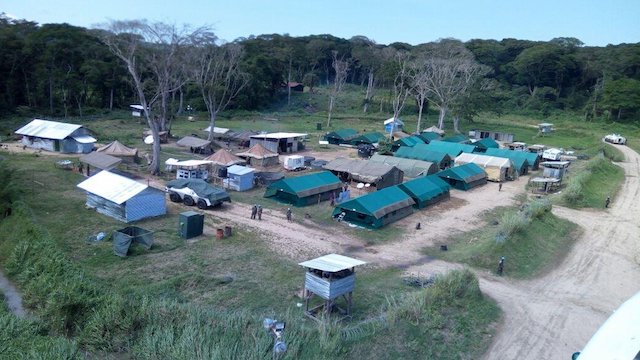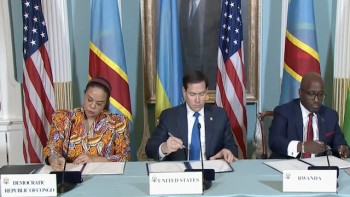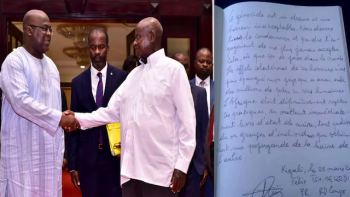In the evening of December 7, 2017, around 5PM, a UN Peacekeeping Forces base located on the banks of the Semuliki river in northeastern Democratic Republic of Congo (DRC) was attacked by an armed group. At least 15 United Nations peacekeepers were killed and dozens wounded. Three peacekeepers went missing. One has since been found. It was one of the deadliest attacks on the international peace keeping forces in years, U.N. officials reported on Friday December 8, 2017.
Based on news reports, AfroAmerica Network investigations, and conversations with FARDC and United Nations
Peacekeeping Forces (MONUSCO) officials, the well organized and methodical attackers wore FARDC uniforms, which allowed them to easily enter the UN peacekeeping base.
Most of the killed were Tanzanians troops serving under MONUSCO. Based on AfroAmerica Network investigations, this is how the events unfolded:
- Every evening, FARDC troops stationed close to MONUSCO base, in a camp known as PK40, came with vehicles to get food from the base occupied by the troops from Tanzania
- Around 4:00 PM, FARDC called MONUSCO base close to Semuliki river to announce that a unit was heading from PK40 to the base to pick up food as usual.
- Shortly before 5:00 PM, as expected by MONUSCO, a group of armed individuals wearing FARDC uniforms approached the MONUSCO base. Since the timing corresponded to the usual schedule and was announced earlier, MONUSCO troops let them in. It appeared that most of the troops in the unit were well know by MONUSCO Tanzanians guards posted at the base entrance.
- The armed group penetrated the compound, but focused on the hall where a control and communication system was based.
- At around 5:00 PM, the attackers bombed the hall, and attempted to destroy the communication system. The MONUSCO Tanzanian troops alerted the MONUSCO base in Beni that they were under attack from three different directions. The attackers destroyed an antenna used for wireless and internet communication, cutting the communication lines.
- MONUSCO Tanzanian troops, realizing they were under attack, riposted. MONUSCO Tanzania troops, apparently better trained, pushed back the attackers. However, attackers sent-in more reinforcements. MONUSCO Tanzanian troops were outnumbered by the reinforcements but resisted until 8:00 PM.
- FARDC troops sent reinforcements in the next morning but the attackers had vanished.
- Immediately after the attack, the United Nations and FARDC officials accused the Allied Democratic Forces (ADF), an Islamist Ugandan rebellion that has been operating in the area for decades.
According to the UN Deputy Secretary General of Peace Keaping Operations, Jean-Pierre Lacroix, "the attack was well prepared, coordinated and executed."
Hence, given the level of coordination, the sophistication of the attack, the overwhelming power, the FARDC uniforms, the known FARDC elements within the attackers, and the quick accusations without material elements, questions were raised on who was really behind the attack.
First, FARDC officers themselves have declared that the attack is rather from FARDC elements, who answer to a parallel commanding structure within FARDC troops based in Beni.
Second, despite the fact that FARDC officials mentioned that 72 attackers were killed, so far no ADF prisoner or casualty has been shown.
Third, the attackers have taken all the provisions and materials in the camp before fleeing. Yet, nobody knows where they fled to.
Fourth, if they were ADF, why no attacks have been launched in areas where ADF combattants are suspected to hide? Why some of the attackers were FARDC elements who were part of previous units who used to pick up food and provisions from the MONUSCO base.
Now, the real question, is, if not ADF, who else? Hence, the speculations and hotted debates. Based on the conversations with FARDC, MONUSCO, and local people, AfroAmerica Network can paint the following picture:
- M23 Rebels who fought FARDC is 2013 and were finally defeated, thanks to Tanzanian troops (see ) have been reorganizing, with the help from DRC President Kabila himself, (see report by Human Rights Watch: “Special Mission” Recruitment of M23 Rebels to Suppress Protests in the Democratic Republic of Congo) and the increase backing, support and reinforcement from Rwandan military
- Joseph Kabila has been deploying them in the Eastern DRC to quash potential resistance against him remaining in office, given that his legal term has ended in December 2016.
- Some current and former high ranking FARDC military commanders, including General Muhindo Akili Mundos and Colonel Richard Bisamaza have been mentioned as leading the effort, in coordination with high ranking Rwandan Defense Forces officers and military commanders.
- ADF, as an organization recently appears to only exist in the headlines of international media and Ugandan government propaganda. Local populations in both North Kivu in DRC and across the border in Uganda said they did not experience ADF activities in recent years.
In light of all these questions, people in North-Kivu and other observers contacted by AfroAmerica Network remain adamant. For them, the attack was conducted by Rwandan government backed and Joseph Kabila's funded former M23 rebels and Rwandan special forces.
Opposition political leaders, including those from the region, such a former Foreign Affairs Minister Antipas Mbusa Nyamwisi have been unequivocal. Antipas Mbusa Nyamwisi confirmed to AfroAmerica Network and other media that the attackers are, without any shred of doubt, connected to Joseph Kabila. He added Joseph Kabila has been recruiting former M23 rebels and Rwandan, Ugandan, Tanzanian, Burundian criminals and security operatives, who would conduct attacks, such as the one on MONUSCO base. Then, Joseph Kabila's government would attribute the attacks to ADF islamists to draw sympathy and support from the international community.
According to most observers, the objective of the attack of MONUSCO base is to get MONUSCO and especially the Tanzanian troops out of DRC as Joseph Kabila is preparing to squash any apposition to solidify his illegitimate grab of power.

















